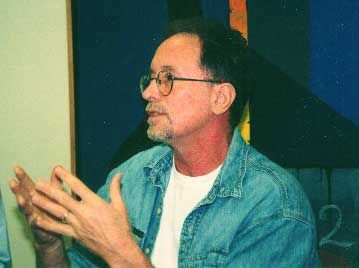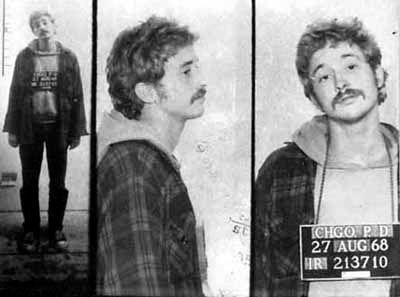
Sunday at Third Unitarian the Forum discussion was led by Bill Ayers, who was billed as an educator, author, and school reform activist, and he came to talk about his experiences as a teacher and public school policy. But so many people showed up to hear him because he used to blow stuff up with the Weather Underground. In his new book he talks about how standardized testing and other tools ostensibly being used to reform public schools are really being used to discredit them and frame the debate as "what can we do about these horrible, failed public schools." The efforts are being led, especially within the Bush Administration, by people who are ideologically opposed to the public schools anyway. Ayers sees this movement as part of a larger movement towards the privatization of public space, and I agree.
Not only are new communities being build with no clear public realm (private yards replace public parks, private malls replace public streets), but everywhere the effort is made to privatize social life. The goal, I think, is to stop resources from being diverted from one community to another. In the past, this country had a more robust public sphere, with a great deal of commitment to public works, public schools and public institutions of all kinds. But access to these goods was more or less restricted to wealthy native-born white men. As other groups successfully demanded access to the public sphere, these elites have withdrawn their resources, for example from urban public schools, in order to do their own thing, set up new suburbs where their tax money will only benefit people like them. When that fails, of course, they just send their kids to private school and vote to lower their own taxes.
In less diverse countries these issues don't play out in the same way, but here it's fairly obvious that white people don't like it when their money gets taxed from them and transferred to non-whites. Movements for "local control" and the like are fairly obviously designed to capture resources for the wealthy white elite and prevent them from being redistributed.
A similar situation exists with Social Security privatization. Yes, the funding system may need an overhaul, but allowing people to take "their" money out of the system and invest it obviously makes the funding situation worse, not better. So why propose such a counterproductive idea? Because now the system works as a safety net, transferring money from workers to retirees. Privatizers want the high income earners to be able to keep the money the contribute for themselves, and make sure nobody else benefits from it. That this would bankrupt the system is irrelevenat - the important thing is that rich people get to keep their money and not allow it to be used to benefit the poor.
George W. Bush has a name for this scheme to empower the rich. He calls it the "Ownership Society." In such a society, private interest who own stuff will control everything that happens. People who don't own much will be shit out of luck.
In practice, poor people, minorities, powerless people want the same thing rich people want - power over their environment, power to shape their communities and their lives to their desires. Democratic government should provide institutions that spread power around and allow as many people as possible to do exactly that - privitization, by contrast, allocates all such power to the wealthy few.
Conservatives like to claim that big government is inherently corrupt and difficult for people to control - but government at least can be held accountable to voters and elected authorities. Private organizations, corporations and the like have no such built-in system of accountability.
I can rant about such things all day, and people will just tell me to drink less coffee. But when Bill Ayers does it, people show up and listen. This is disconcerting to say the least. While he has been a teacher for years (Kindergarten, college and points in between) and does know a lot about education and all, he has a megaphone because he detonated a bomb at the Pentagon, etc. I agree with him on a lot of stuff, and he's a very personable, friendly guy. But do you have to blow stuff up to get a hearing in today's America? The problem with Ayers as a spokesman is that by listening to him, you are assumed to be taking sides in a cultural conflagration that happened before I was born. And people either love him or loathe him before they even hear what he has to say.
But who else is talking about this stuff at all? Too often our communities, our "culture," gets dismissed as non-political, as background, as uncontrollable as the weather. But our communities are being rebuilt every day, and we deserve a say in how we live. If the rest of us won't speak out, then for now we're gonna have Ayers as a spokesman. Maybe we do need a Weatherman to know which way the wind blows.

1 comment:
"But do you have to blow stuff up to get a hearing in today's America?"Short answer: yes. Or, more accurately, you have to get the other side mad enough to blow stuff up, so that you can point and yell, "Look at the crazy person! Be on my side!"
"Terrorist" is a term that gets overused and misunderstood in today's climate. From what I know of them, the WU seemed to feel that their violence was justified because of the extreme violence being perpetrated by the American government in Vietnam. Now, in order for that logic to work, you have to believe two things:
1) The US was not justified in entering Vietnam, and
2) that violence to the US gov't would cause them to withdraw.
Now, I don't want to debate whether the US should have entered that conflict, because I don't know enough about it, but an unrelated actor who is threatening/causing violence on behalf of the oppressed isn't an effective deterrent. It obviously backfired on bin Laden a few years back, if you truly believe that his motive was to help Islam. (Which I don't. Again, that's a different post.)
Ayers' past activities cause a funny synthesis of legitimacy and illegitimacy. If not for the WU, he wouldn't have his soapbox. Because of the WU, he is considered radical fringe and possibly still considered dangerous. (Wave to the FBI agents here; how often do you suppose they Google his name?) We need to continue to cultivate and advance his ideas on education and public spheres, but we must route them through a different spokesperson.
Post a Comment